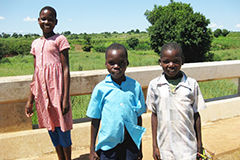Contemporary Forms of International Peacebuilding Discussed at the World Congress of the International Political Science Association
2021.10.13
Executive Senior Research Fellow Muto Ako and Research Fellow Rui Saraiva of the JICA Ogata Sadako Research Institute for Peace and Development participated online in the 26th World Congress of the International Political Science Association (IPSA) on July 10, 2021, in a panel entitled “Contextualizing International Cooperation for Sustaining Peace in Complex, Protracted, and Recurring Armed Conflicts.” Both researchers discussed contemporary forms of international peacebuilding in armed conflicts by analyzing various case studies. The chair of the panel was Professor Matsuno Akihisa of Osaka University and the co-chair was Muto.
Saraiva presented his research findings compiled in his paper entitled “Contextualizing Peacebuilding in Mozambique’s Resurgence of Conflict (2013–2019): Direct Dialogue and DDR in an Increasingly Complex Environment,” published in the IPSA conference proceedings. First, he provided an overview of the conflict history in Mozambique, including the independence war (1964–1974), the civil war (1977–1992) between the Mozambique Liberation Front (FRELIMO) and the Mozambican National Resistance (RENAMO), and the civil war’s recent resurgence (2013–2019) despite peacemaking and peacebuilding efforts from various actors. By providing several examples of mediation in Mozambique, he illustrated that the adaptive mediation approach combined with direct dialogue had achieved more favorable results than standard mediation approaches, such as domestic mediation without process facilitation and high-level international mediation. Moreover, he attributed the success of the mediation process to the adaptive mindset of the mediators. He stated that an adaptive approach, which has become predominant in the mediation process in recent years, has also paved the way for a new peace agreement signed in 2019 and the new Disarmament, Demobilization, and Reintegration (DDR) programs. Further, he suggested that an adaptive approach should also be effective for implementing future peacebuilding programs.

Children pose for a photo, in Mozambique where peacebuilding efforts continue (Photo: JICA)
Next, Muto presented her research findings compiled in a paper entitled “Implications and Challenges of Externally Driven and Locally Led Peacebuilding Approaches in a Complex Context: A Case Study of the Syrian Conflict,” which was also published in the IPSA conference proceedings. She started discussing the complexity of the Syrian conflict that was characterized not only by the government and several contested parties to the conflict but also by contradictory external interventions by the supporting countries to each of them—the countries in the region and the permanent members of the United Nations Security Councils. Then, she introduced two examples of locally-led approaches adaptive to the conflict context: the Civil Society Support Room (CSSR), initiated by the third Special Envoy, served as a political channel for the Syrian citizens for providing direct inputs to the peace process, and the National Agenda for the Future of Syria (NAFS), established by the United Nations Economic and Social Commission for Western Asia (UNESCWA), which would also be an example of the Syrian-led approach for post-conflict peacebuilding. She emphasized the importance of such settings for citizen participation; however, it was almost impossible to exclude the influence of external interventions in Syria, and the adaptive approaches remain to be mainstreamed even after more than a decade of conflict.

Old town street of Damascus, Syria. Locally-led peacebuilding approaches are needed in Syria
In the panel session, JICA Senior Advisor Taniguchi Miyoko presented a paper entitled “Examining an Alternative Approach of Peacebuilding in Mindanao, the Philippines.” Tateyama Ryoji, professor emeritus at National Defense Academy, also joined and presented a paper, “Temporary International Presence in Hebron (TIPH): Impartiality and Adaptive Peace Building Approach in Structural Asymmetry.” Gordon Kojo Nyame Mensah-Yawson, Ph.D. Candidate at Fudan University, delivered a presentation on “Institutional University, Diversity of Cultures and People of Africa: An Evolutionary Examination of the Design of the African Peace and Security Architecture.”
The panel discussants commented on the papers presented in context of the academic panel. Nakauchi Masataka, associate professor at Sophia University, highlighted the complexities of local contexts, which directly challenge the processes of creating and maintaining a balance between local, regional, and international involvements in peace initiatives. Commenting on the case study of Mozambique, he questioned the possible reasons that led to the collapse of 20 years of peace and the drive for the Mozambican government to accept renewed power sharing and peace processes. His comments on the case of Syria focused on the motives of different stakeholders and the complexities and contradictions of applying deterministic and adaptive approaches to peace actions in the extraordinary situation of Syria. Additionally, he discussed the case studies of Mindanao, Hebron, and the African Union, raising important questions about the unique complexities of each study.
Imai Kohei, research fellow at IDE-JETRO, commented about the uniqueness of the “adaptive” peacebuilding approach and questioned its general principles and its application to different conflict situations from a critical perspective. He discussed the meaning and application of adaptive mediation and institutional learning in the case study of Mozambique. His comments for the case study on Syria raised concerns about the effectiveness of peacebuilding initiatives amidst the ongoing conflict. Further, Imai raised questions about conceptual clarity and the interdisciplinary character of the case studies of Hebron, Mindanao, and the African Union.
The research findings presented in this panel aim at contributing to the understanding of emerging context-specific peacebuilding approaches and informing the implementation of sustaining peace resolutions and the 2030 Agenda.

事業事前評価表(地球規模課題対応国際科学技術協力(SATREPS)).国際協力機構 地球環境部 . 防災第一チーム. 1.案件名.国 名: フィリピン共和国.

事業事前評価表(地球規模課題対応国際科学技術協力(SATREPS)).国際協力機構 地球環境部 . 防災第一チーム. 1.案件名.国 名: フィリピン共和国.

事業事前評価表(地球規模課題対応国際科学技術協力(SATREPS)).国際協力機構 地球環境部 . 防災第一チーム. 1.案件名.国 名: フィリピン共和国.

事業事前評価表(地球規模課題対応国際科学技術協力(SATREPS)).国際協力機構 地球環境部 . 防災第一チーム. 1.案件名.国 名: フィリピン共和国.

事業事前評価表(地球規模課題対応国際科学技術協力(SATREPS)).国際協力機構 地球環境部 . 防災第一チーム. 1.案件名.国 名: フィリピン共和国.
scroll